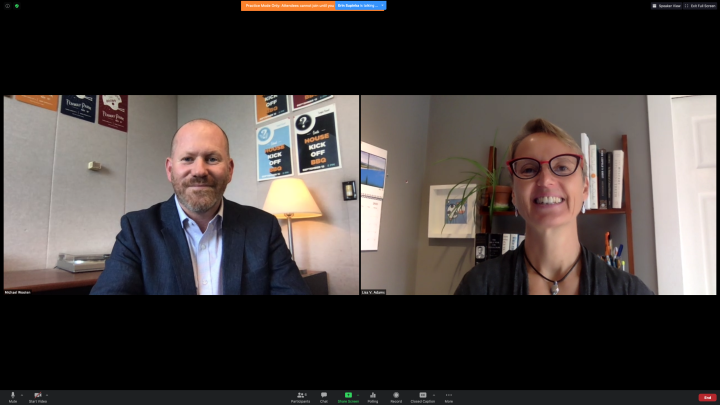Provost Joseph Helble expressed optimism about how the Dartmouth community has come together during the first week of classes to navigate the challenges posed by the COVID-19 pandemic. Most undergraduate students have been on campus for a week and, along with classmates not on campus this term, are taking courses remotely, Helble said in this week’s Community Conversations.
The provost spent part of last week helping members of the Class of 2024 get tested for the virus on their arrival and on their third and seventh days on campus.
“I was struck by the enthusiasm of the new students,” he said. “They were all behind masks, but you could hear it in their voices and you could see it in their eyes—they were thrilled to be here, even with the restrictions” the pandemic has imposed on campus.
Helble also had a message for students—about half of all undergraduates—who are not on campus, but studying remotely around the country and the world.
“The faculty and staff are deeply committed to your education regardless of whether you’re in Hanover or thousands of miles away,” Helble said. “It’s important to remember that fall orientation was conducted last week for all new students in the Class of 2024, including those who are unable to be with us in Hanover this fall.”
Classes—most held remotely—have been in session for graduate and professional school students, some of whom live in Dartmouth housing, most live in Hanover or neighboring Upper Valley communities.
As of today, Dartmouth has conducted more than 8,000 tests of students, faculty, and staff, according to the COVID-19 Reporting Dashboard. There have been two positive test results among students; a third positive result came from a test administered outside of Dartmouth. All three students are in isolation. Dartmouth’s positivity rate this week is 0.05%, with a 0.03% positivity rate overall, which Helble called “consistent with those we are seeing at peer institutions.”
Joining Helble this week were COVID-19 Task Force Co-Chair Lisa Adams, associate dean for global health and an associate professor of medicine at the Geisel School of Medicine; and Michael Wooten, associate dean of residential life and director of residential education. The three took questions from viewers in a conversation moderated by Justin Anderson, vice president for communications.
Adams clarified the difference between quarantine—used to restrict the movements of people who might have been exposed to the virus or have traveled, but who are not sick—and isolation, which separates people who have tested positive or who show symptoms of illness and are awaiting test results. Dartmouth has more than 550 private rooms reserved for those needing isolation.
“I’m really proud of how many rooms we’ve reserved for isolation and quarantine, because it is significantly more than most of our peers,” Adams said. “I think we are in good stead to be able to give everybody who needs to have their own room and access to their own private bathroom that space.”
Adams explained some of the numbers on the COVID-19 dashboard and encouraged community members to give feedback on how the COVID-19 health and epidemiology working group might improve the information it provides. The dashboard has received more than 30,000 pageviews since it was launched on Sept. 1.
Wooten—whom Helble spotted “bicycling all around the campus from residence hall to residence hall,” checking in on student arrivals last week, called this year’s move-in the most unusual in his 22 years of experience. But, he said, “My biggest surprise was the delight of seeing students and their parents—especially the ’24s—who were so excited to be back.”
Wooten says undergraduate house communities are organizing activities for their members, on campus and off, and staff are working hard to meet the challenges of feeding students in quarantine and managing new patterns of operations, such as trash pickup and cleaning. He also explained how students can schedule times to safely retrieve from storage belongings left on campus last winter.
Helble thanked the more than 100 employees who have volunteered their time in the past two weeks to help with testing and moving in.
“As we look ahead to the remainder of fall term, there’s no hiding this—this is not going to be easy,” Helble said. “This is asking a lot of our community. It’s asking personal sacrifice for the greater good.”
But after what he’s seen in the past two weeks, Helble says he’s confident that Dartmouth can succeed.
“I think back to the conversations I had with members of the Class of 2024 in the testing line. Their excitement about being part of this community leaves me highly optimistic that we can navigate this as a successful fall term and engage all of our students, residential and remote alike, in a meaningful and rich educational experience.”
Community Conversations is an online forum for Dartmouth community members to ask questions and learn from campus leaders about the institution’s priorities, decisions, and operations during the pandemic. The live discussions, produced by Dartmouth’s Media Production Group and the Office of Communications, air on selected Wednesdays at 3:30 p.m. The next webcast is scheduled for Sept. 30.
Past episodes are available on the Community Conversations site, which includes call-in numbers for those who want to listen to the show without video. Find out how to watch or listen to the live webcast.
For the most recent information on Dartmouth’s response to the pandemic, visit the COVID-19 website.
Hannah Silverstein can be reached at hannah.silverstein@dartmouth.edu.


